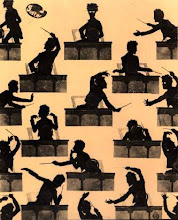And for this day-before-Christmas post, I'm going to be taking a look at some recent proverbial puddings gone sour.
(Yes, this is where Renfield breaks his promise about global affairs; and starts referring to himself in the third person.
But bear with me, or disregard the first part of the post.)
To begin with, there's the problem of money.
Everyone thought we had a lot of that, particularly in my recently-adopted home here in the UK; that we'd made "a grand old pudding" with our collective economic growth (bar a few African people, but we don't talk to them), and that we would, in some imaginary time, all be able to live long lives of prosperity.
Now it seems that is no longer the case, and everyone despairs.
Hang on a second. What's the big deal? The poor are still poor, some of the rich are now poor, and the banks are bust. The anarchist's dream - Mikhail [Bakunin] would be so proud! Or at best, a lot of money will change hands, the economy will be shaken up, and on we go.
Now, I won't attempt to hide how facetious I consider this last view, when the international community practically runs on money (that has run out). But the reason I'm bringing this up, and the topic to begin with, is that I consider the common reason for despair misguided.
The economy, as I mentioned, is arguably the neural system of the modern world; perhaps any era. And to that extent, an arrest of this system is like a stroke. So it certainly stands to reason that anyone should be worried over the crisis, even if their pension is not at stake.
This was a sudden and heavy stroke suffered by the system, and people despair over its suddenness and seriousness. But - and here is my point - what about the brain damage?
Through thousands of years of social and technological and ideological development, we've come to a point where almost the entire pool of our ideas as humankind are on the same table. Centuries ago, a lost civilisation had the pieces picked up by an adjacent one that replaced it: there was someone to compare and contrast.
Who will step in now, for this meta-evaluation?
Damage control has rightly been the order of the day. But who can as rightly guarantee that things that now take the bullet for the rest to survive - institutions (the Bank of Scotland comes to mind, or pretty much the entire Icelandic banking network), economic ideologies (free-market capitalism) or social roles (bankers) - all deserve it, at the speed that this drive-by-shooting* is taking place?
This is my concern: have we (as mankind) realised how effectively we can wipe out social realities and practices from ever coming into being or practice for decades, if ever? Despite the consensus that the reasons for the crisis were these insitutions and practices, will we be later able to retrieve from the wreckage those of them that weren't?
Or will progress towards whatever direction it follows have denied us this chance, by then? This is a dangerous permanence, that I am not sure the 21st-century citizen of the "developed world" has fully understood. There's no system recovery for this one.
Made your day yet?
Pudding number 2 for the day-before-Christmas: Tabula Rasa.
Tabula Rasa, for those of you not in the know, was an MMORPG (a Massively Multiplayer Online Role-Playing Game - don't make me type this again), created by famous game designer Richard Garriot as a new take on the genre. It did not succeed.
But many MMO's do not "succeed", as such; in fact, almost all of them but World of Warcraft. And Tabula Rasa had ideas to it, versus, say, an amusing attempt at an MMO with space racing.
Yet the Tabula Rasa servers are now due to be shut down on the 28th of February, RPS reports. This is a sour pudding for quite a few reasons, the most prominent of which are two:
Firstly, the game actually had some thought behind it. It was not a mindless copy of another game, and it was not an attempt to cash in on a combination of two (or more) different and otherwise incompatible concepts or play-styles. Even on its own, this leaves a sour taste in the mouth - much less if one considers, secondly, that there are games like I just mentioned still running!
Everquest 2? City of Heroes? Indeed a very sour pudding to swallow, when the post-WoW age of MMOs is still desperately looking for a standard-bearer to signal its dawn; inauspicious.
Pudding three, on the last main topic left: the Gramophone.
I have been reading "The Gramophone", as it was once called prior to being re-branded for "approachability", for almost half a decade. There are people who have been reading it for more than half a century.
And both they (judging by the letters' section of rival publications) and I seem to agree: the Gramophone magazine has gone sour.
- Authority is all but replaced by swagger.
- With two exceptions I can think of, the best reviewers of the Gramophone have in common that they're all dead.
- The articles are becoming assemblies of aphorisms.
- The "greatest recording of the past 30 years" is apparently one of the Saint-Säens piano concertos
- And last month, we had the "world's best orchestra", complete with top-10 countdown run-up, on parade.
When are they issuing the collectible cards?
And that's it for now! If you've lasted this long, congratulations; I didn't.
Look forward to something more cheery tomorrow morning (or evening, as the case may be), and thanks for reading my blog!

No comments:
Post a Comment